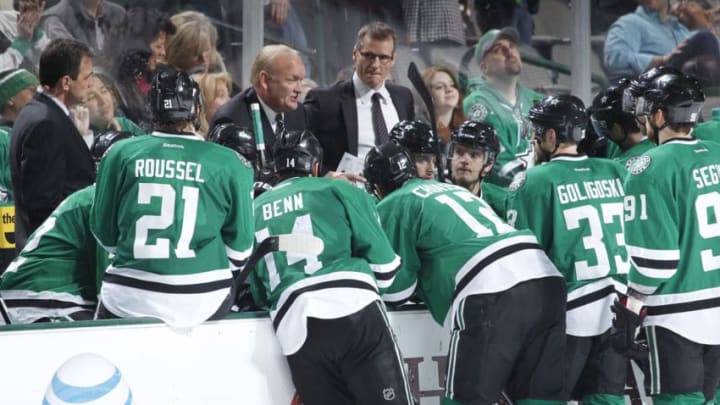
Another season is in the books for Dallas Stars general manager Jim Nill. He’s seen a variety of results through five seasons with his five different teams. Each team has its own characteristics, so let’s take a look at each one.
The Dallas Stars supposedly turned a page in April 2013.
It was April 27, 2013. The Stars had just closed out their lockout-shortened 2013 season with a stale and humbling 3-0 loss to the Detroit Red Wings. But that wasn’t what Stars fans were focusing on. Instead, they were focused on the hopeful future.
Midway through the final game, it was announced that Stars general manager Joe Nieuwendyk had been fired by the organization. The Stars hired Jim Nill, an assistant GM from Detroit, to fill the void. And that offseason, the “big change” began.
If there was any NHL team that needed a big change, it was Dallas. After missing the playoffs for a fifth consecutive season in 2013, it was clear that the organization was heading in a wrong direction. With that being said, the front office hit the reverse switch and made the necessary changes. Nill was expected to bring the Stars out of the hole of mediocrity and back into being a consistent contender.
More from Blackout Dallas
- Dallas Stars Traverse City Tournament: Who had great performances?
- Grushnikov and Stankoven lead Dallas Stars to 6-3 win over Columbus
- Dallas Stars prospects look to wrap up tournament with a win
- Burn the tapes: Dallas Stars prospects lose 5-1 to Toronto Maple Leafs
- Dallas Stars look to continue success today against the Maple Leafs
But fast forward to five years later, and what do they have? Besides a Central Division title in 2016 and one playoff series win, what else is there for them to boast? The Dallas Stars have yet to only qualified for the playoffs in two of Nill’s five years at the helm and are missing out for the second straight season right now.
Is Nill the only one to blame for the lack of the massive turnaround that Stars fans were promised? Not at all. But he definitely gets a share of it.
Nill has done some great things for the Dallas Stars in his five years. From signing big name talent in the offseason to pulling off big blockbuster trades, he’s known for his offseason activity and ability to make splashes.
But he’s also been through two head coaches in five seasons and cannot seem to get those splashes to produce. The Stars look tremendous on paper but continue to struggle with closing out respective seasons. And in some cases, they never find a way to get started. And with this lack of production comes consistent change in an effort to get things right.
At the conclusion of the 2017-18 regular season, Jamie Benn, Tyler Seguin, Antoine Roussel, and Kari Lehtonen still remaining from the first Stars team of the Nill era. By October 2018, Benn and Seguin may very well be the only two still around. While they are two significant pieces, that isn’t the most impressive stat.
So how has each Dallas Stars team done for Nill in his five years? What are the good and bad parts of each team? Is there any correlation? And how does each team rank in Nill’s tenure so far?
Since it’s now May and we are likely in for another offseason of big change, let’s take a look at his first few teams so far.
